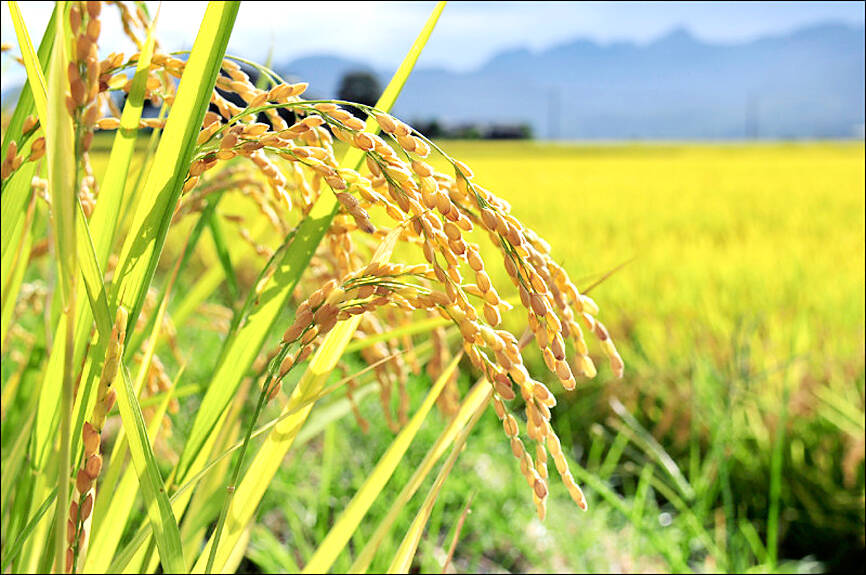Taiwanese scientists have created a genetically modified rice strain that contains 25 to 30 percent more vitamin B1 without diminishing yield, research project head Hsieh Ming-hsiun (謝明勳) said.
The research, which involves splicing genes that govern vitamin production in Escherichia coli with Taiwan’s indigenously developed rice variety Tainun 67, was published in The Plant Journal in November last year.
White rice, which is consumed as a staple food in most of East Asia, is produced by removing the bran and germ from the grain through polishing, said Hsieh, a research fellow at Academia Sinica’s Institute of Plant and Microbial Biology.

Photo: Taipei Times file
Unfortunately, the parts removed in the polishing process are also the main store of gluten and vitamin B1 in the grain, resulting in a loss of essential nutrition, he said.
Brown rice, which retains the bran and germs, is more nutritious than polished rice, but its rough texture is considered displeasing by most people, he said.
To improve public health and well-being, the research team headed by Hsieh sought to boost the vitamin B content in rice via genetic manipulation, he said, adding that the project took five years to complete.
A significant challenge that the team overcame was ensuring the designed crop had a high enough yield to make planting economically viable, he said.
Three years ago, a group of Dutch scientists had created gene-modified rice that contained two to three times the vitamin B of normal rice, but the variety’s poor yield prevented commercial success, he said.
The Academia Sinica team’s creation, which features an
identical yield to its parent variety, stores vitamin B1 in the grain itself, allowing the rice to be polished without losing nutritional value, he said.
Vitamin B1 deficiency could cause many conditions including swelling in the lower limbs, numbness, nerve damage, enlarged heart and digestive problems, Hsieh said, citing data from the Ministry of Health and Welfare.
Taiwanese for the most part are free of vitamin B deficiency and cultivating genetically modified crops is prohibited by law, but the rice the team designed could still be useful for poor countries with a rice-dominant diet, he said.
The team is continuing work to increase the variety’s vitamin content and palatability, he said.

Alain Robert, known as the "French Spider-Man," praised Alex Honnold as exceptionally well-prepared after the US climber completed a free solo ascent of Taipei 101 yesterday. Robert said Honnold's ascent of the 508m-tall skyscraper in just more than one-and-a-half hours without using safety ropes or equipment was a remarkable achievement. "This is my life," he said in an interview conducted in French, adding that he liked the feeling of being "on the edge of danger." The 63-year-old Frenchman climbed Taipei 101 using ropes in December 2004, taking about four hours to reach the top. On a one-to-10 scale of difficulty, Robert said Taipei 101

Nipah virus infection is to be officially listed as a category 5 notifiable infectious disease in Taiwan in March, while clinical treatment guidelines are being formulated, the Centers for Disease Control (CDC) said yesterday. With Nipah infections being reported in other countries and considering its relatively high fatality rate, the centers on Jan. 16 announced that it would be listed as a notifiable infectious disease to bolster the nation’s systematic early warning system and increase public awareness, the CDC said. Bangladesh reported four fatal cases last year in separate districts, with three linked to raw date palm sap consumption, CDC Epidemic Intelligence

US climber Alex Honnold left Taiwan this morning a day after completing a free-solo ascent of Taipei 101, a feat that drew cheers from onlookers and gained widespread international attention. Honnold yesterday scaled the 101-story skyscraper without a rope or safety harness. The climb — the highest urban free-solo ascent ever attempted — took just more than 90 minutes and was streamed live on Netflix. It was covered by major international news outlets including CNN, the New York Times, the Guardian and the Wall Street Journal. As Honnold prepared to leave Taiwan today, he attracted a crowd when he and his wife, Sanni,

Taiwanese and US defense groups are collaborating to introduce deployable, semi-autonomous manufacturing systems for drones and components in a boost to the nation’s supply chain resilience. Taiwan’s G-Tech Optroelectronics Corp subsidiary GTOC and the US’ Aerkomm Inc on Friday announced an agreement with fellow US-based Firestorm Lab to adopt the latter’s xCell, a technology featuring 3D printers fitted in 6.1m container units. The systems enable aerial platforms and parts to be produced in high volumes from dispersed nodes capable of rapid redeployment, to minimize the risk of enemy strikes and to meet field requirements, they said. Firestorm chief technology officer Ian Muceus said